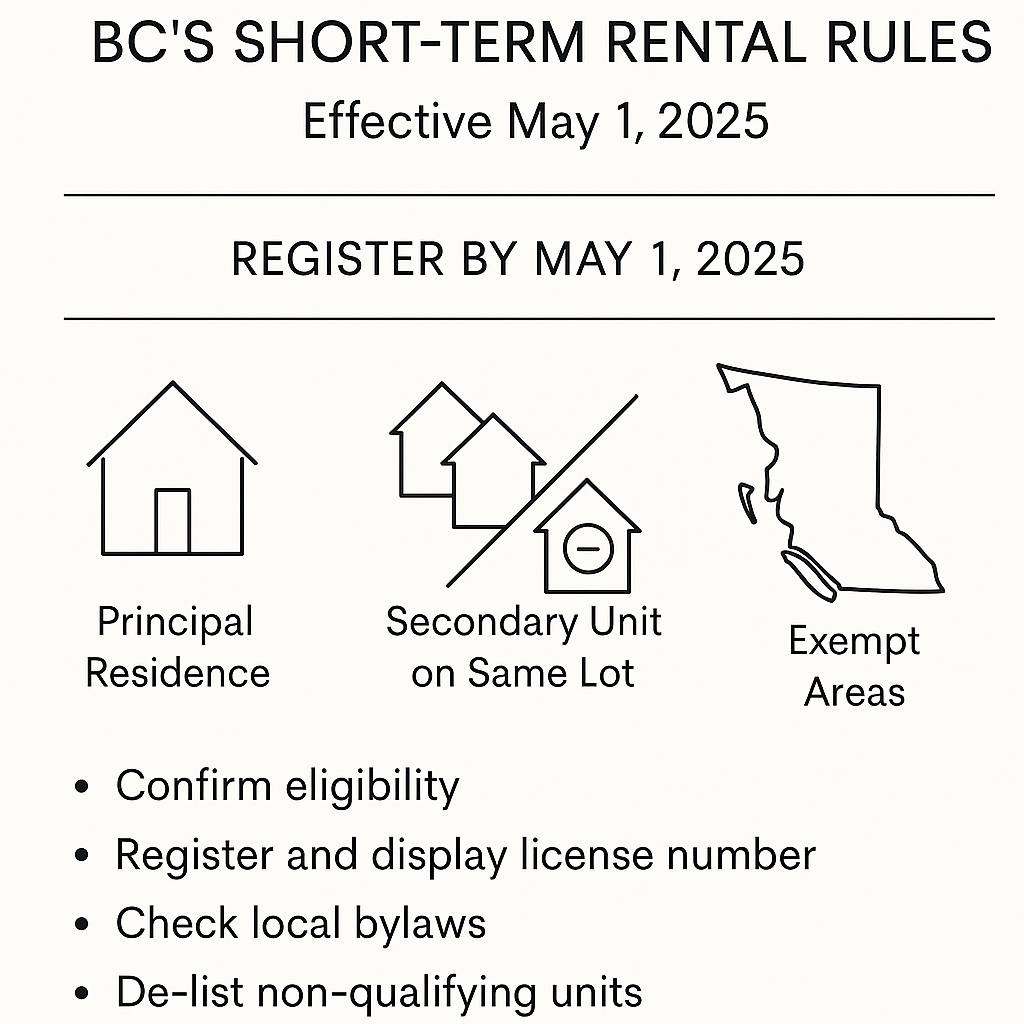
BC’s Short-Term Rental Rules: What Property Owners Must Know Before May 1, 2025
The BC government has rolled out sweeping changes to how short-term rentals (STRs) are regulated across the province. These new rules aim to increase long-term rental housing availability by placing stricter limits on who can operate STRs—and where.If you’re a homeowner or investor using platforms like Airbnb or Vrbo, here’s what you need to know to stay compliant—and avoid costly penalties.
Critical Deadline: Register by May 1, 2025
As of May 1, 2025, all short-term rental operators in British Columbia must register their property with the province’s STR Registry. This requirement applies to any property being rented for periods of fewer than 90 consecutive days.Failure to register means:
- Your listing will be removed from short-term rental platforms.
- Bookings will be canceled starting June 1, 2025.
- Fines of up to $10,000 per day may be imposed for non-compliance.
The government has made it clear: operating an STR without registration is no longer an option in most communities.
What Properties Qualify for Short-Term Rentals?
To operate legally under the new rules, your property must meet one of the following criteria:
1. Principal Residence
You may operate a short-term rental in your principal residence—the home where you live most of the year. This includes the option to:
- Rent out your home while you’re away.
- Offer a room or portion of your home to guests on a short-term basis.
Acceptable proof of principal residence includes government-issued ID, utility bills, or property tax statements.
2. Secondary Unit on the Same Lot
You may also list one additional unit located on the same property as your principal residence, such as a:
- Basement suite
- Laneway home
- Garden suite
This applies only if both dwellings are on the same legal parcel of land.
Where the Rules Apply (and Where They Don’t)
The new STR policy targets areas with high housing demand. Specifically:
- It applies in municipalities with populations of 10,000 or more.
- Smaller communities can choose to opt in.
- Resort municipalities and designated rural areas are exempt from the principal residence rule.
If you own a second property in a resort or rural zone, you may still operate it as a short-term rental—but you will still need to register.
How to Register Your Property
- Visit the BC STR Registry.
- Submit required documentation, including proof of residence and property details.
- Pay the registration fee:
- $100 for principal residence listings
- $450 for non-principal residences in exempt areas
Once registered, you will receive a unique license number that must appear on all your STR listings.
Local Bylaws Still Apply
In addition to the provincial rules, most municipalities have their own STR regulations. For example:
- Vancouver: Requires a valid business license and limits rentals to principal residences only.
- Victoria: Restricts STRs in most residential zones unless grandfathered in.
- Kelowna, Kamloops, Nanaimo: Have introduced local bylaws in line with the provincial rules.
Before listing, consult your local government website or contact city staff to ensure full compliance.
Penalties for Non-Compliance
The province has created a dedicated enforcement unit, and penalties are significant:
- Up to $5,000 per day for individuals operating without registration
- Up to $10,000 per day for corporations or commercial operators
- Immediate removal of non-compliant listings from platforms
- Cancellation of existing reservations beginning June 1
What You Can Do Now
To stay on the right side of the law—and keep your revenue stream active—take the following steps:
- Confirm that your property qualifies under the principal residence rule.
- Register your STR before the May 1 deadline.
- Add your license number to all listings.
- Review your local city’s bylaws and licensing requirements.
- De-list any properties that no longer qualify for short-term rental use.
Final Thoughts
These regulations represent a significant change to BC’s short-term rental landscape. They will reduce the number of available STR units, impact the value of some investment properties, and shift many listings to long-term rental or owner-occupied use.If you have questions about your specific property—or are considering buying or selling real estate in BC—reach out for expert guidance on how to adapt your strategy to the new rules.
